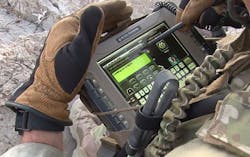Galois seeks to advance trusted computing and cryptography technologies using zero-knowledge proofs
ARLINGTON, Va. – U.S. military researchers needed a company to enhance information security and trusted-computing by advancing zero-knowledge proof technology to enable cryptography in complex military applications. They found their solution from Galois Inc. in Portland, Ore.
Officials of the U.S. Defense Advanced Research Projects Agency (DARPA) in Arlington, Va., announced a $12.6 million contract to Galois on Friday for the Securing Information for Encrypted Verification and Evaluation (SIEVE) project.
Galois trusted computing experts will seek to advance the state of the art in zero-knowledge proofs to enable complex military applications. A zero-knowledge proof in cryptography enables one party to prove that he knows a particular without conveying any secret information; the challenge is proving possession of sensitive information without revealing the information itself.
Company engineers will use zero knowledge proofs to verify military capabilities without revealing the sensitive details. They also will focus on increasing the efficiency of zero knowledge proof technology to enable large, complex proof statements -- such as billions of gates or more -- where the statement consists of probabilistic and indeterminate-branching conditions.
Related: Trusted computing: an overview
Zero-sum proofs typically are for cryptocurrency transactions. This technology, however, is insufficient for complex proof statements in which any superlinear complexity could create an insurmountable efficiency bottleneck.
SIEVE focuses on zero-knowledge proofs for statements about cyber security and cyberspace operations, which historically have been difficult for the U.S. military to discuss in a verifiable way without releasing sensitive information.
SIEVE will demonstrate the feasibility of encoding complex military statements into intermediate representations that can help create efficient zero-knowledge proofs for those statements.
The SIEVE program is organized into three phases -- an 18-month first phase, an 18-month second phase, and a 12-months third phase. DARPA released the initial solicitation for the SIEVE project last summer. Galois prevailed over 12 other bidders.
The first phase emphasizes ways to demonstrate feasibility of encoding military statements into intermediate representations, and for giving efficient zero-knowledge proofs in military scenarios. The second phase emphasizes an integrated pipeline to create zero-knowledge proofs from intermediate-representation-encoded statements. The third phase emphasizes optimization and scaling techniques.
The program is divided into three technical areas: constructing useful zero-knowledge statements; building efficient zero-knowledge proof generation compilers; and post-quantum zero knowledge.
Constructing useful zero-knowledge statements focuses on generating encodings of real-world military problem statements into an intermediate representation to generate an efficient zero-knowledge proof.
Building efficient zero-knowledge proof generation compilers focuses on generating new theory and software to generate efficient zero-knowledge proofs from an intermediate representation-encoded problem statement. DARPA officials say they expect to award several contracts for each technical area.
On this contract Galois will do the work in Portland, Ore., and should be finished by May 2024. For more information contact Galois online at https://galois.com, or DARPA at www.darpa.mil.

John Keller | Editor-in-Chief
John Keller is the Editor-in-Chief, Military & Aerospace Electronics Magazine--provides extensive coverage and analysis of enabling electronics and optoelectronic technologies in military, space and commercial aviation applications. John has been a member of the Military & Aerospace Electronics staff since 1989 and chief editor since 1995.

